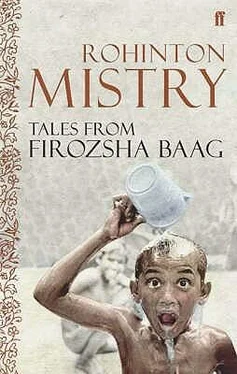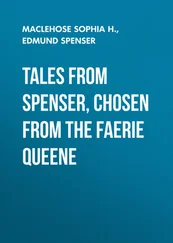Rohinton Mistry - Tales From Firozsha Baag
Здесь есть возможность читать онлайн «Rohinton Mistry - Tales From Firozsha Baag» весь текст электронной книги совершенно бесплатно (целиком полную версию без сокращений). В некоторых случаях можно слушать аудио, скачать через торрент в формате fb2 и присутствует краткое содержание. Год выпуска: 2006, Издательство: Faber & Faber, Жанр: Современная проза, на английском языке. Описание произведения, (предисловие) а так же отзывы посетителей доступны на портале библиотеки ЛибКат.
- Название:Tales From Firozsha Baag
- Автор:
- Издательство:Faber & Faber
- Жанр:
- Год:2006
- ISBN:нет данных
- Рейтинг книги:3 / 5. Голосов: 1
-
Избранное:Добавить в избранное
- Отзывы:
-
Ваша оценка:
- 60
- 1
- 2
- 3
- 4
- 5
Tales From Firozsha Baag: краткое содержание, описание и аннотация
Предлагаем к чтению аннотацию, описание, краткое содержание или предисловие (зависит от того, что написал сам автор книги «Tales From Firozsha Baag»). Если вы не нашли необходимую информацию о книге — напишите в комментариях, мы постараемся отыскать её.
Tales From Firozsha Baag — читать онлайн бесплатно полную книгу (весь текст) целиком
Ниже представлен текст книги, разбитый по страницам. Система сохранения места последней прочитанной страницы, позволяет с удобством читать онлайн бесплатно книгу «Tales From Firozsha Baag», без необходимости каждый раз заново искать на чём Вы остановились. Поставьте закладку, и сможете в любой момент перейти на страницу, на которой закончили чтение.
Интервал:
Закладка:
The weight of grief was heaviest around Dr. Mody when he returned from work in the evenings. As the car turned into the compound he usually saw Pesi before Pesi saw him, in scenes which made him despair, scenes in which his son was abusing someone, fighting, or making lewd gestures.
But Dr. Mody was careful not to make a public spectacle of his despair. While the car made its way sluggishly over the uneven flagstones of the compound, the boys would stand back and wave him through. With his droll comments and jovial countenance he was welcome to disrupt their play, unlike two other car-owners of Firozsha Baag: the priest in A Block and the chartered accountant in B who habitually berated, from inside their vehicles, the sons of bank clerks and bookkeepers for blocking the driveway with their games. Their well-worn curses had become so predictable and ineffective that sometimes the boys chanted gleefully, in unison with their nemeses: “Worse than saala animals!” or “junglee dogs-cats have more sense!” or “you sataans ever have any lesson-paani to do or not!”
There was one boy who always stayed apart from his peers — the Bulsara boy, from the family next door to the Modys. Jehangir sat on the stone steps every evening while the gentle land breezes, drying and cooling the sweaty skins of the boys at play, blew out to sea. He sat alone through the long dusk, a source of discomfiture to the others. They resented his melancholy, watching presence.
Dr. Mody noticed Jehangir, too, on the stone steps of C Block, the delicate boy with the build much too slight for his age. Next to a hulk like Pesi he was diminutive, but things other than size underlined his frail looks: he had slender hands, and forearms with fine downy hair. And while facial fuzz was incipient in most boys of his age (and Pesi was positively hirsute), Jehangir’s chin and upper lip were smooth as a young woman’s. But it pleased Dr. Mody to see him evening after evening. The quiet contemplation of the boy on the steps and the noise and activity of the others at play came together in the kind of balance that Dr. Mody was always looking for and was quick to appreciate.
Jehangir, in his turn, observed the burly Dr. Mody closely as he walked past him each evening. When he approached the steps after parking his car, Jehangir would say “Sahibji” in greeting, and smile wanly. He saw that despite Dr. Mody’s constant jocularity there was something painfully empty about his eyes. He noticed the peculiar way he scratched the greyish-red patches of psoriasis on his elbows, both elbows simultaneously, by folding his arms across his chest. Sometimes Jehangir would arise from the stone steps and the two would go up together to the third floor. Dr. Mody asked him once, “You don’t like playing with the other boys? You just sit and watch them?” The boy shook his head and blushed, and Dr. Mody did not bring up the matter after that.
Gradually, a friendship of sorts grew between the two. Jehangir touched a chord inside the doctor which had lain silent for much too long. Now affection for the boy developed and started to linger around the region hitherto occupied by grief bearing Pesi’s name.
II
One evening, while Jehangir sat on the stone steps waiting for Dr. Mody’s car to arrive, Pesi was organizing a game of naargolio . He divided the boys into two teams, then discovered he was one short. He beckoned to Jehangir, who said he did not want to play. Scowling, Pesi handed the ball to one of the others and walked over to him. He grabbed his collar with both hands, jerking him to his feet. “Arré choosya!” he yelled, “want a pasting?” and began dragging him by the collar to where the boys had piled up the seven flat stones for naargolio .
At that instant, Dr. Mody’s car turned into the compound, and he spied his son in one of those scenes which could provoke despair. But today the despair was swept aside by rage when he saw that Pesi’s victim was the gentle and quiet Jehangir Bulsara. He left the car in the middle of the compound with the motor running. Anger glinted in his eyes. He kicked over the pile of seven flat stones as he walked blindly towards Pesi who, having seen his father, had released Jehangir. He had been caught by his father often enough to know that it was best to stand and wait. Jehangir, meanwhile, tried to keep back the tears.
Dr. Mody stopped before his son and slapped him hard, once on each cheek, with the front and back of his right hand. He waited, as if debating whether that was enough, then put his arm around Jehangir and led him to the car.
He drove to his parking spot. By now, Jehangir had control of his tears, and they walked to the steps of C Block. The lift was out of order. They climbed the stairs to the third floor and knocked. He waited with Jehangir.
Jehangir’s mother came to the door. “Sahibji , Dr. Mody,” she said, a short, middle-aged woman, very prim, whose hair was always in a bun. Never without a mathoobanoo , she could do wonderful things with that square of fine white cloth which was tied and knotted to sit like a cap on her head, snugly packeting the bun. In the evenings, after the household chores were done, she removed the mathoobanoo and wore it in a more conventional manner, like a scarf.
“Sahibji? she said, then noticed her son’s tear-stained face. “Arre, Jehangoo, what happened, who made you cry?” Her hand flew automatically to the mathoobanoo , tugging and adjusting it as she did whenever she was concerned or agitated.
To save the boy embarrassment, Dr. Mody intervened: “Go, wash your face while I talk to your mother.” Jehangir went inside, and Dr. Mody told her briefly about what had happened. “Why does he not play with the other boys?” he asked finally.
“Dr. Mody, what to say. The boy never wants even to go out. Khoedai salaamat raakhé , wants to sit at home all the time and read storybooks. Even this little time in the evening he goes because I force him and tell him he will not grow tall without fresh air. Every week he brings new-new story books from school. First, school library would allow only one book per week. But he went to Father Gonzalves who is in charge of library and got special permission for two books. God knows why he gave it.”
“But reading is good, Mrs. Bulsara.”
“I know, I know, but a mania like this, all the time?”
“Some boys are outdoor types, some are indoor types. You shouldn’t worry about Jehangir, he is a very good boy. Look at my Pesi, now there is a case for worry,” he said, meaning to reassure her.
“No, no. You mustn’t say that. Be patient, Khoedai is great,” said Mrs. Bulsara, consoling him instead. Jehangir returned, his eyes slightly red but dry. While washing his face he had wet a lock of his hair which hung down over his forehead.
“Ah, here comes my indoor champion,” smiled Dr. Mody, and patted Jehangir’s shoulder, brushing back the lock of hair. Jehangir did not understand, but grinned anyway; the doctor’s joviality was infectious. Dr. Mody turned again to the mother. “Send him to my house on Sunday at ten o’clock. We will have a little talk.”
After Dr. Mody left, Jehangir’s mother told him how lucky he was that someone as important and learned as Burjor Uncle was taking an interest in him. Privately, she hoped he would encourage the boy towards a more all-rounded approach to life and to the things other boys did. And when Sunday came she sent Jehangir off to Dr. Mody’s promptly at ten.
Dr. Mody was taking his bath, and Mrs. Mody opened the door. She was a dour-faced woman, spare and lean — the opposite of her husband in appearance and disposition, yet retaining some quality from long ago which suggested that it had not always been so. Jehangir had never crossed her path save when she was exchanging civilities with his mother, while making purchases out by the stairs from the vegetablewalla or fruitwalla.
Читать дальшеИнтервал:
Закладка:
Похожие книги на «Tales From Firozsha Baag»
Представляем Вашему вниманию похожие книги на «Tales From Firozsha Baag» списком для выбора. Мы отобрали схожую по названию и смыслу литературу в надежде предоставить читателям больше вариантов отыскать новые, интересные, ещё непрочитанные произведения.
Обсуждение, отзывы о книге «Tales From Firozsha Baag» и просто собственные мнения читателей. Оставьте ваши комментарии, напишите, что Вы думаете о произведении, его смысле или главных героях. Укажите что конкретно понравилось, а что нет, и почему Вы так считаете.












